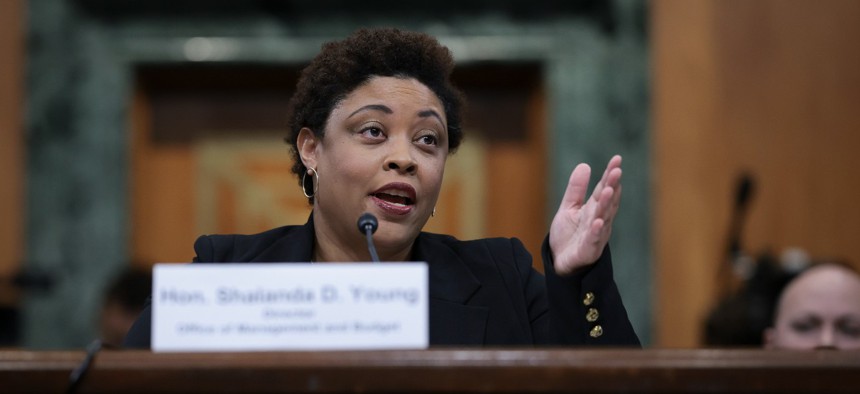
OMB Director Shalanda Young testifies before the Senate Budget Committee Wednesday. Win McNamee/Getty Images
Biden's Budget Chief Defends Proposed Spending Increases and 5.2% Pay Raise
The president is willing to negotiate over final spending levels, OMB director tells lawmakers, but will not accept cuts to government programs.
The White House’s top budget official on Wednesday fended off Republican attacks on President Biden’s proposal to significantly increase agency spending levels, saying the plan would allow necessary investments to deliver key services and the cost would be offset by revenue increases.
Office of Management and Budget Director Shalanda Young pushed back on Republican efforts to slash non-defense funding in fiscal 2024, saying that doing so would have drastic effects on the U.S. economy and disproportionately impact Americans in need. The increases in Biden’s budget blueprint would boost cancer research, deliver better results for veterans, improve the nation’s security posture and support expanded diplomacy. Alternative suggestions to slash discretionary spending would “obliterate” child care programs, starve low-income home heating programs, disrupt border security operations and upend many other priorities, Young said.
“The list goes on and on,” she told members of the Senate Budget Committee.
Republican lawmakers repeatedly feuded with Young, saying she mischaracterized their views on entitlement reforms, misrepresented the impact that tax increases for wealthy individuals and corporations would have on the economy, exaggerated the net impacts of the budget on federal deficits and supported spending increases unnecessary to meet the current moment.
“President Biden is proposing levels of debt, deficits and spending previously reserved for times of world war or recession,” said Sen. Chuck Grassley, R-Iowa, the top Republican on the panel.
Young pledged that the White House would work with Republicans to determine final appropriations for the upcoming fiscal year, saying Biden would engage in a bipartisan fashion to “talk about what the appropriate spending levels are.”
“Let me be clear,” she added as a warning. “The president is not going to support cutting programs that are essential to working families in this country.”
Republicans responded in kind, letting the White House know much of its blueprint was dead on arrival. Even Young demurred when asked if the budget should get a vote on the Senate floor, saying it would not be appropriate for her to weigh in on the congressional schedule.
“It’s Congress that ultimately determines annual spending and revenue levels, not the president's annual budget,” said Sen Mike Lee, R-Utah. “And it should be noted that many of the largest policies embedded in this particular request have zero chance of becoming law, particularly in the current divided Congress.”
Sen. Patty Murray, D-Wash, who chairs the Senate Appropriations Committee, said during the hearing she is already working "very closely" with her ranking member, Sen. Susan Collins, R-Maine, to press "forward with writing our appropriations bill in a bipartisan way."
Young highlighted some areas of the budget that could have bipartisan support. She noted Biden proposed increasing spending on border technology by $500 million while investing in improvements to land ports of entry. The $6.9 trillion proposal included investments in inspectors general and other programs to root out fraud, which Young said would help crack down on waste.
The OMB director also defended Biden’s proposal for a 5.2% pay raise for federal employees, which would mark the largest increase since 1980, saying the number simply followed the jump in the Bureau of Labor and Statistics’ economic cost index. She said pay raise parity with the members of the military was important to the administration, especially as troops and civil servants often work side by side and toward the same mission.
“It was the right thing to do and our federal workers really have overperformed during this difficult time,” Young said.
Sen. Sheldon Whitehouse, D-R.I., who chairs the budget committee, said he was looking forward to debating the merits of Biden’s proposals.
“Here’s our choice: President Biden’s pro-growth investments, which also decrease our deficits by nearly $3 trillion versus spending cuts deep enough, economists believe, to plunge the U.S. into a recession,” Whitehouse said. “Seems like an easy choice. We welcome the debate.”







